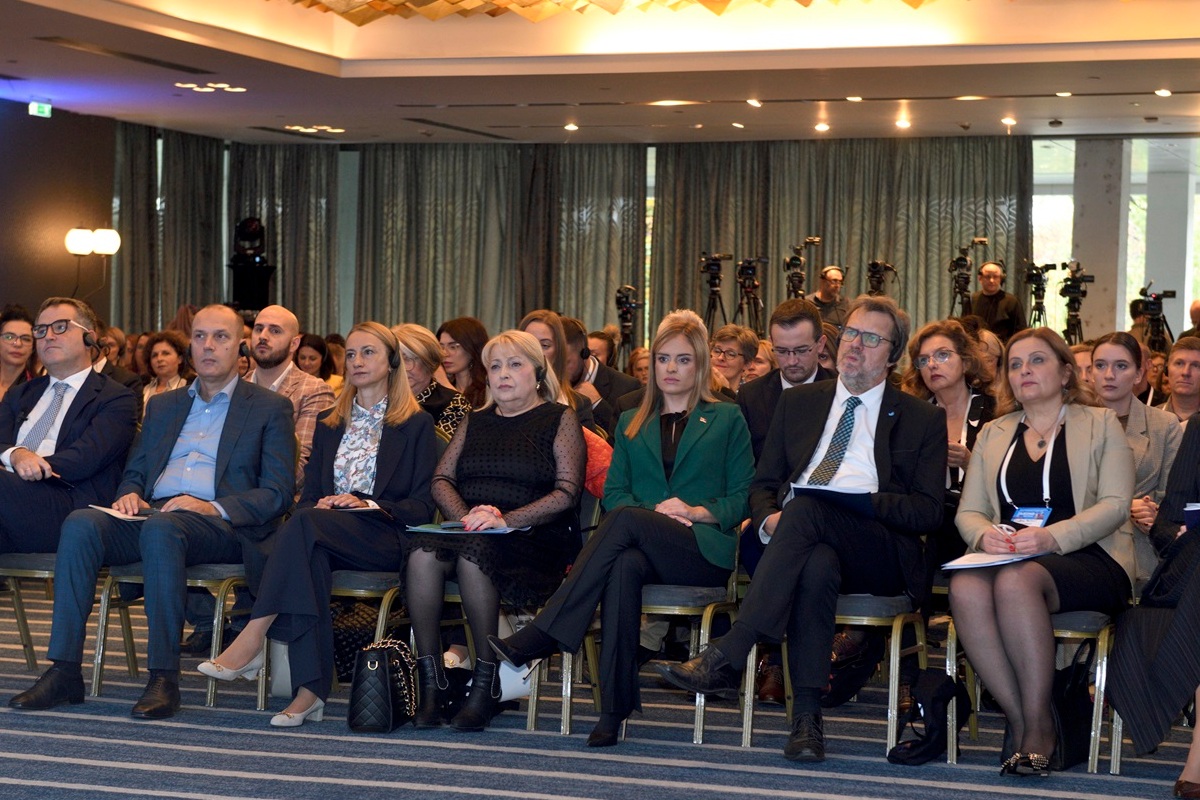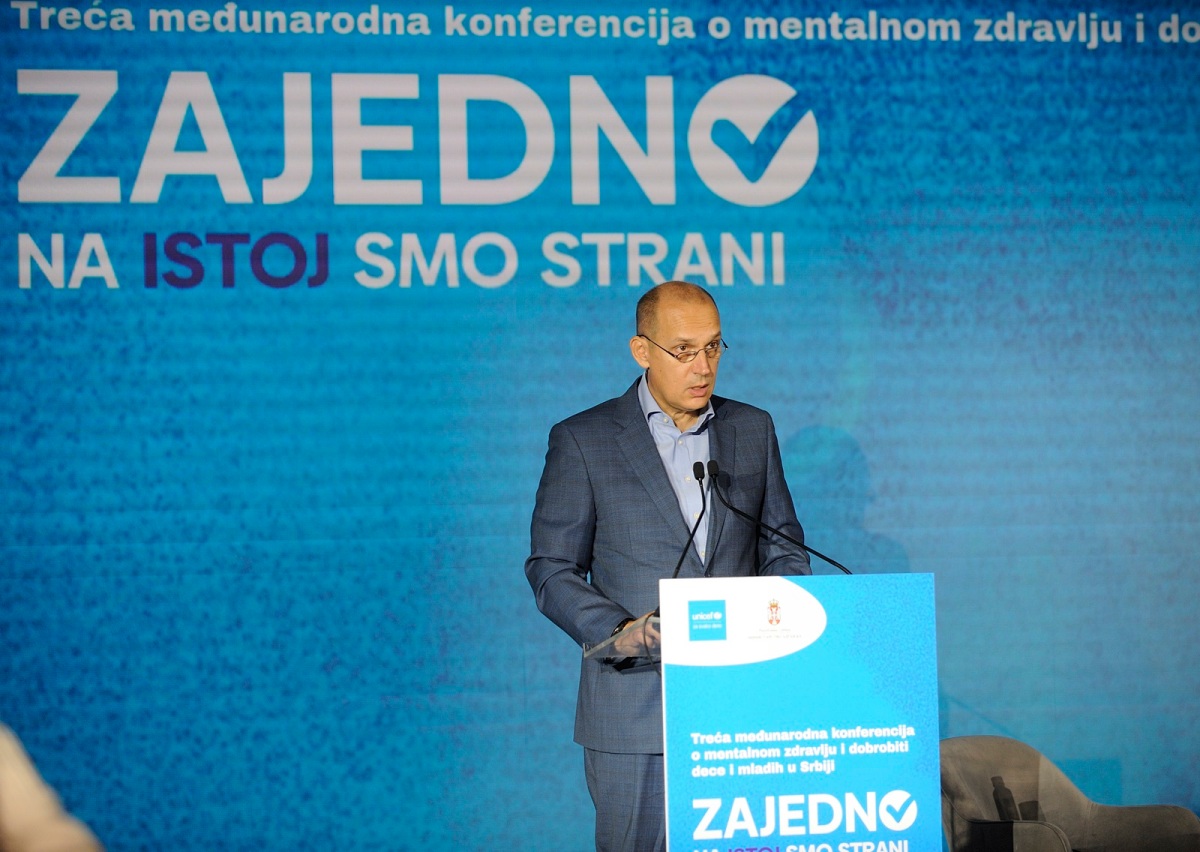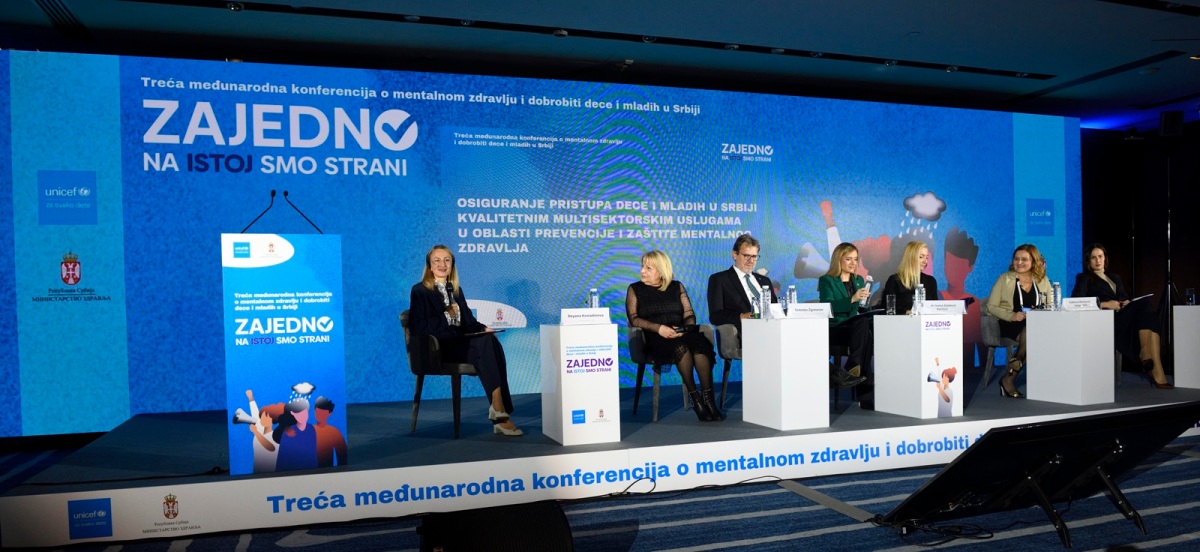The establishment of a Working Group for the Protection of Children’s and Youths’ Mental Health and the development of an Action Plan with clearly defined responsibilities across sectors are some of the results of a year-long implementation of the Memorandum of Understanding signed by six ministries.

Belgrade 04.10.2024.
©UNICEF Serbia/2024/Shubuckl
Progress has also been made at the local level, where cooperation among institutions in five cities and municipalities is leading to the development of local cooperation protocols, ensuring better support for children, youth, and parents. This was highlighted at the Third International Conference on Mental Health and Psychosocial Support for Children and Youth.
In his address, Minister of Health Zlatibor Lončar emphasized that the mental health of children is the foundation upon which the future is built. “The Government of the Republic of Serbia and the Ministry of Health, with the support of all relevant ministries, are committed to improving systemic care for the mental health of children, youth, and parents. Together, we are using all available resources to provide quality support, especially for the most vulnerable children and youth. This step represents an important move forward in reforming and improving the support system for mental health in our country. A healthy Serbia is our shared goal, and healthy children are our greatest and most important investment in the future,” said Minister Lončar.

Belgrade 04.10.2024.
©UNICEF Serbia/2024/Shubuckl
Ahead of World Mental Health Day on 10 October, the Third International Conference brought together experts and professionals from education, healthcare, social protection, and youth organizations. The conference also marked one year since the signing of the Memorandum of Understanding by six ministries: the Ministry of Health, Ministry of Education, Ministry of Tourism and Youth, Ministry of Labour, Employment, Veteran and Social Affairs, Ministry of Human and Minority Rights and Social Dialogue, and the Ministry of Family Care and Demography.
Deyana Kostadinova, Director of UNICEF in Serbia, highlighted the importance of providing continuous psychological and emotional support to children and young people. “The healthy development of youth represents Serbia’s future. Every child and young person must have access to services that support mental health. Early intervention is a wise investment—it strengthens Serbia’s economic resilience and ensures long-term sustainable growth. If we act now, we can reduce negative outcomes such as crime, substance abuse, and early school dropout. At the same time, we can build a healthier and more productive society. This conference is crucial as it fosters the partnerships needed to take joint responsibility for the mental well-being of youth, including collaboration with ministries, the corporate sector, and other key partners,” said Deyana Kostadinova.
A healthy Serbia depends on prioritizing the mental health of children as the foundation for the future
Prof. Dr. Fabio Skano, Director of the World Health Organization (WHO) in Serbia and Special Envoy of the WHO Regional Director for the Western Balkans, emphasized the significance of mental health for the future of society. “Our role as parents and teachers is to encourage open conversations about mental health and to urge young people to seek help when needed. It’s not enough just to seek understanding; it’s important to offer it as well. By prioritizing young people’s mental health, we are investing in a brighter, healthier future for all. Together, with collective efforts, we can make a significant difference in the lives of young people,” said Dr. Fabio Skano.
During the conference, both national and international examples of good practice were presented. Of particular interest was the Minimal Service Package for Youth, developed in collaboration with the Institute of Mental Health, which has the potential to significantly improve the availability and quality of services at the local level.
Early intervention in mental health can significantly reduce negative outcomes like crime, substance abuse, and school dropouts, creating a healthier, more productive society
Džana Numanović, a representative of the UNICEF Youth Board, spoke about the importance of services that meet the needs of young people. “We need easily accessible mental health services and information tailored to different groups of children and young people—those from the general population and those who are often neglected, such as children and young people from the Roma community or those with developmental disabilities. If professional support becomes standard, if we normalize seeking help, and if we use online platforms for accessible and anonymous support, we can help overcome stigma and change how we talk about mental health,” said Džana Numanović.
Respecting the rights of children and youth to good mental health and well-being is key to realizing all their other rights. Only through joint efforts can we ensure that the mental health of children, adolescents, and caregivers becomes a priority in every family, school, workplace, and community. This was the key message of this year’s conference.

Belgrade 04.10.2024.
©UNICEF Serbia/2024/Shubuckl